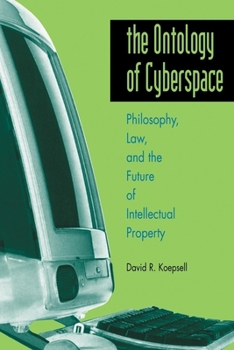Ontology of Cyberspace: Philosophy, Law, and the Future of Intellectual Property
Select Format
Select Condition 
Book Overview
With the proliferation of computer software and media, controversies have arisen around copyright and patent law. This book is based on the idea that the cyberworld encompasses all computer-mediated... This description may be from another edition of this product.
Format:Paperback
Language:English
ISBN:0812695372
ISBN13:9780812695373
Release Date:February 2003
Publisher:Open Court
Length:160 Pages
Weight:0.49 lbs.
Dimensions:0.4" x 6.0" x 9.2"
Customer Reviews
3 ratings
Comprehensive, enlightening, accessible
Published by Thriftbooks.com User , 17 years ago
In the excellent "Ontology of Cyberspace," author David Koepsell neatly dispels commonplace myths and legal ambiguities emanating from the cyberspace revolution and challenges the often impenetrable, lingo-laden world of computer-mediated phenomena. "Cyberspace is nothing really strange or special," says Koepsell, and very much a part of ordinary experience, taking up real space in real time in the form of bits, bytes, algorithms, and programs. These "products" or "expressions" of cyberspace "are best treated by a "unified intellectual property scheme," argues Koepsell, which will go a long way in allowing cyberspace to flourish as an economic and social power. Idealized and constructivist notions of cyberspace, which hinge on the belief that computers somehow transcend the physical realm, are clearly called into question. Computer-generated objects and phenomena are very much like books, machines--real property--and shouldn't require special treatment by the law, but because a "correct" ontology of cyberspace isn't clearly delineated in the law, ambiguities and contradictions have arisen in attempts to protect (copyright/patent) the properties of cyberspace, according to Koepsell. It's the way in which cyberspace is understood and categorized that determines how it will be regulated--Koepsell provides an ontology of cyberspace that is practical, realistic, and logical. "Computer-mediated phenomena are expressive objects just like any others," he writes, but "misguided lawmaking and misperceptions in popular culture about the nature of computer-mediated phenomena will continue to hinder this medium's true potential and stifle its growth." I highly recommend this book for anyone wanting to understand the true nature/components of cyberspace and how its growth is hindered until its nature is clearly agreed upon in a legal sense.
Very highly recommended, articulate, and thoughtful
Published by Thriftbooks.com User , 23 years ago
With his superbly presented work, The Ontology Of Cyberspace: Law, Philosophy, And The Future Of Intellectual Property, David Koepsell addresses the problems of protecting intellectual property rights in the computer age. Koepsell, Executive Director of the Center for Applied Ontology and adjunct assistant professor of philosophy at the State University of New York: Buffalo, defines terminology, identifies the problems inherent in a rapidly expanding electronic communications technology that transcends national boundaries, and has become ubiquitous in our personal, social, economic, educational, business, and literary life. The Ontology Of Cyberspace presents both the scholarly community and the non-specialist general reader with a very highly recommended, articulate, definitive, thoughtful, informative, and "reader friendly" text.
Demystifying Cyberspace, Revolutionizing Intellectual Prop.
Published by Thriftbooks.com User , 23 years ago
David Koepsell is a philosophically and legally trained internet ontologist who has decisively established cyberspace as not a realm populated by virtual objects, but as an arrangement or ordinary objects (like electrical charges) resident in computers and peripherals, and nothing more. Any internet ontologist, any lawyer dealing with intellectual property, and anyone facinated with computers and the internet will find this book a welcome and refreshing antidote to mystical, McLuhan-esque conceptions. And Koepsell explains several alternatives to the complex and prolix system of patents and copyrights as ways of addressing intellectual property. A MUST READ!!





